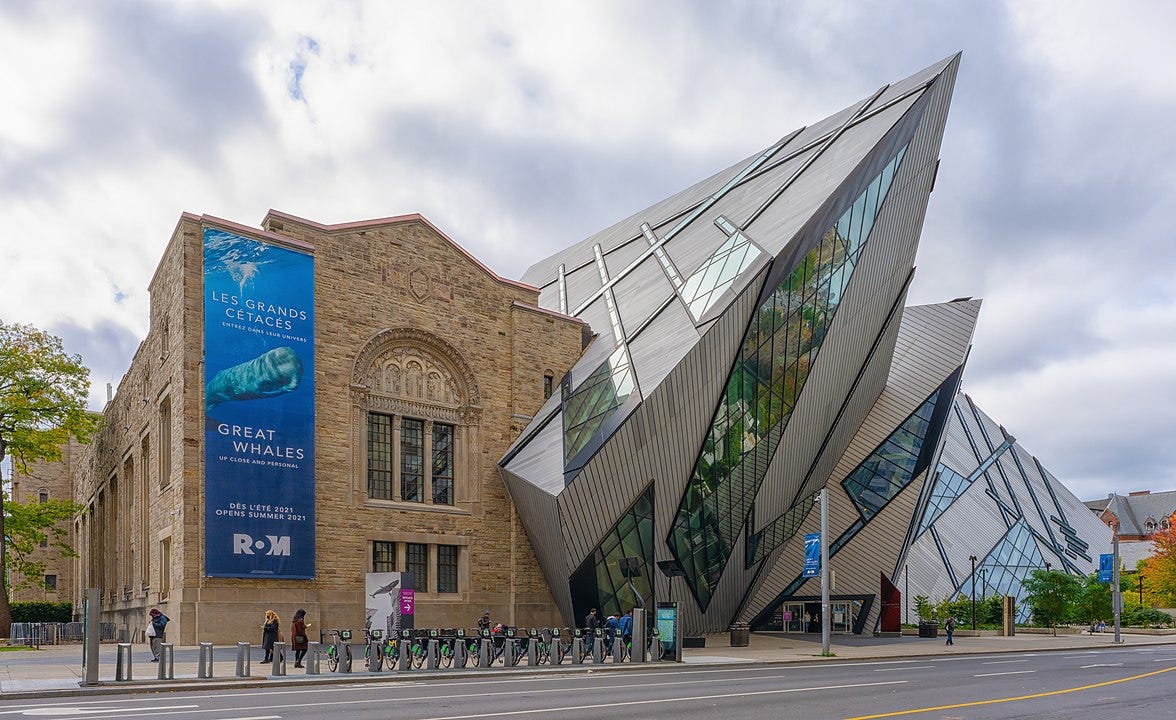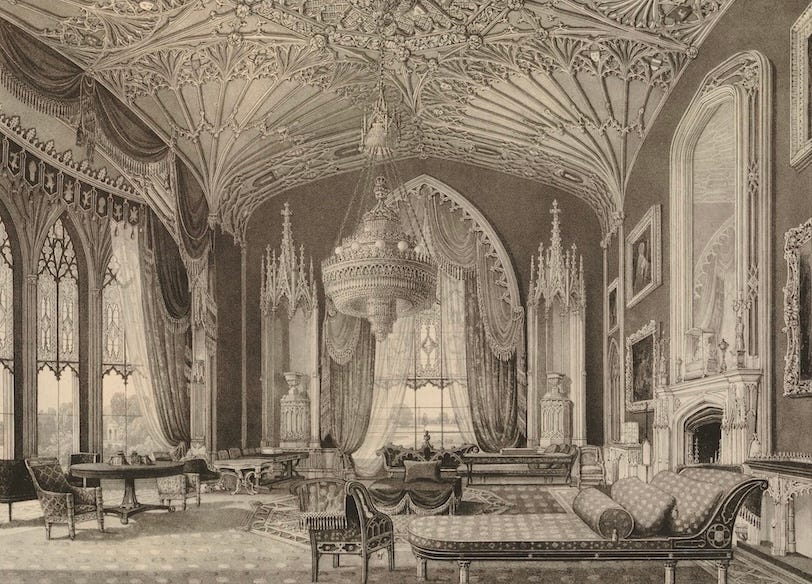Why Did Wealth Stop Building Beautiful Things?
An era of impermanence
Why are the wealthiest men of today seemingly incapable of building beautiful things?
Why will they leave no glorious libraries, cathedrals, parks, or artworks behind? And why do they spring up and then disappear, creating no great family dynasties?
In this article, we explore why wealth in modern times is so often fleeting, corrosive, and incapable of translating into lasting beauty — and what all families (wealthy or not) can do instead to create an enduring impact…
Reminder: you can support us and get tons of extra content for a few dollars per month. You’ll get:
New, full-length articles 2x per week
The entire archive of content (150+ articles, essays, and podcasts)
Membership to our bi-weekly book club (and community of readers)
We are currently reading Tolkien’s “The Fellowship of the Ring” in our book club. The next meeting is Wednesday, December 3, at noon ET — join us!
An Era of Impermanence
In their 2023 work ‘The Missing Billionaires’, Victor Haghani and James White noted that today’s rich are not successful at preserving the one thing you would expect them to be: their wealth.
The ultra-wealthy now emerge into and vanish out of history with astonishing rapidity, leaving little of substance behind. Ours is an era of impermanence.
If the 1000 wealthiest American families from 1900 had reproduced at the normal rate, achieved basic investment returns, and spent reasonably, they would have created 16,000 billionaire households today — but there are only 700, and almost none can trace their wealth back further than the 1980s.
Equally astonishing is elites’ growing choice to disinherit their children, spending their wealth down or giving it away. They seem to sense that they have failed to transmit the necessary virtues to their children to steward wealth wisely.
Rejection of Eternal Values
What we build is a reflection of what we believe.
The wealthy are not lazy — indeed, average working hours among elite professions are now longer than they have ever been, and the richest man in the world sleeps on the floor of his office.
But the oligarch worldview is that our current age should be transcended. The tech elite believe that our sufferings and sorrows — our limited capabilities and lifespans — can be overcome. Accelerating technological development will save the human condition.
Anything which slows this transcendence down is thus unethical. Design choices which imply permanence, tradition, and ‘weight’ are instinctively rejected.
Subconsciously, they prefer buildings which are aerodynamic and utilitarian. Materials are light: stone is replaced with glass. Ornamentation — seen as unnecessary baggage — is stripped off. Mass production is efficient, so it is fine if cities look the same.
Dislocation From Eternal Time
This preference for light materials stands in contrast to the patrons of the past, who lived in ‘eternal time’. The kings of old believed that their experiences, struggles, and hopes were part of a divine pattern which would recur until the end of days — and were thus of eternal relevance.
When William I, Duke of Aquitaine, founded the Abbey of Cluny in 910, he spoke of his desire to transform the “temporal goods conferred upon me” into “lasting” ones. He gave generously to the Abbey. His only request was that the monks should pray unceasingly for him and his generations.
The monks built one of the most valuable libraries in Europe, preserving texts of great import. Their famous architectural practices inspired Christendom for centuries. Cluny stands to this day as a marvel.
Beauty and Eternity Are Linked
Our society’s lack of beauty and rejection of permanence are intimately related. Influential sociologist E. Digby Baltzell believed that a healthy society is one in which the elite are a balance of new and old money.
The existence of new money indicates healthy social mobility — that talent and hard work are rewarded. The existence of old money indicates stability and families who think on generational timescales.
The total dominance of new money — as we have today — is a problem. Though gifted at ‘maximising shareholder value’, such figures make poor leaders in the domains of aesthetics, faith, taste, and culture.
It takes one set of skills to establish financial wealth, but another to create a truly beautiful society. The latter requires a broad, aristocratic, and spiritual education that first generation wealth has rarely received.
Aware of their ignorance, many wealthy figures are too intimidated to patronize art at all.
Does Wealth Always Bring Impermanence?
A proverb has gained in popularity over the last century: shirtsleeves to shirtsleeves in three generations. The implication is that society’s leading families should expect collapse and plan accordingly.
Was it always this way? Does wealth guarantee impermanence? No.
There’s a remarkable study by Matthew Bond and Julien Morton called ‘Trajectories of Aristocratic Wealth’, which tracks the arcs of Britain’s leading families over centuries.
What they found is fascinating. Around 1900, noble titles were granted to a number of hugely wealthy industrial magnates — but within a century, these lineages had flamed out, and it was again the ‘old money’ families who were the wealthiest and most powerful, “like the tortoise to the hare”.
There is something special about these families. Hugh Grosvenor, Duke of Westminster, inherited Britain’s largest trust in 2016. His family traces its aristocratic lineage back almost one thousand years, to when Gilbert le Grosveneur came to England with William the Conqueror in 1066.
What is it that sets these families apart? What is it that these ‘thousand-year families’ know that escapes our oligarchs? The histories of the great men of the West, supported by contemporary interviews with their descendants, point to the same five principles.
Together, these principles allow families to raise wealthy children while avoiding their corruption, allowing them to transcend the ‘shirtsleeves’ phenomenon and carry a family legacy deep into the future, creating beauty all the while.
All families — whatever their station — can learn from them…
1) Never Neglect Fundamentals
The lack of the basic fundamentals of raising a healthy family is an error into which many of the newly rich fall. They convince themselves that by devoting their time to work, and generating ever more massive wealth, they are doing their children a favor. Not so.
Without sufficient spiritual and psychological training against temptation, increasing children’s wealth harms them. Building these defenses starts with the most basic actions which all parents should undertake.
Be present with your children, eat with them, play with them, listen to them. Trust that if you give them a lovely upbringing (with truth, beauty, play, prayer, athletics, and adventures) they will be set on a virtuous path.
Consider the simple ‘family meal’. As Eduard Habsburg-Lothringen — Archduke Eduard of Austria — tells in the history of his noble family ‘The Habsburg Way’:
After all, it is around a dinner table with many siblings that children absorb the virtues… children who see their parents together, and witness the love and respect that they have for each other, are given strength and security and told implicitly that it is worthwhile to grow up and engage in society. You know your parents (and your siblings) will always have your back.
Likewise, every upper caste has always been trained in a noble and dangerous sport: hunting boars, racing across the polo field — even ritualized dueling in the aristocratic practice of mensur at elite German universities.
Hard sport builds the discipline to joyfully embrace hardship and pain. The child who masters his body against sloth, gluttony, and cowardice is well disposed to later master his spirit against lust, avarice, and corruption.
2) Assert Family Rituals
Build a ‘ritual-protected family’.
What are rituals? Rituals are not just routines. Rituals transcend routines when they become symbolically endowed; when they are given a special meaning and aesthetic.
Rituals assert a break from conventional existence. They stand out and become memorable. The transition from mundane to sacred is felt strongly in rituals: the night before Christmas, the joining of hands before grace, the lights turned off before the birthday candles are lit.
Rituals assert ‘this is who we are’. In their repetition both backwards and forwards in time, they convey stability, structure, belonging, and a sense of ‘rightness’. They define a boundary between correct and incorrect, between family and outsider.
Drawing on French aristocrat Antoine de Saint-Exupéry, philosopher Byung Chul Han noted that, while houses are homes in space, rituals are homes in time. Rituals are an assertion of continuity — you act as your ancestors acted before you. They shift the family from the moment into ‘eternal time’.
3) Ensure Your Family Has Faith and Knows Duties
Wealthy children must not feel that they are untouchable. It is necessary to impose on even the most privileged children that they are not, in fact, at the summit of all hierarchies.
They must not be left without a goal which requires great effort to achieve. They must know that there are goods that their wealth cannot purchase for them, and punishments that their wealth cannot save them from. You must teach them faith.
Their belief must be authentic and intense, and reinforced from an early age. The only King of France to become a saint — Louis IX — was told by his mother Blanche of Castile that she would rather he lay dead at her feet than that he should commit a single mortal sin.
Louis went on to commission perhaps the most beautiful chapel in Europe.
For those children who have the financial freedom to do anything, true freedom comes from the strength to say ‘no’ to the endless temptations which will beset them.
4) Assert Identity, Mission, and Values
It is not wealth as such that is spiritually poisonous, but the sense of pointlessness that can arise in a life in which man desires only what he can easily buy. This gives rise to nihilism, hedonism, and destruction.
Countering this aimlessness requires the cultivation of aspirations and responsibilities so great that money cannot buy them. This is a multi-generational project which the greatest houses undertake. It is ultimately a manifestation of the quest for the virtue of magnanimity.
Magnanimity by its very name denotes stretching forth of the mind to great things… a man is said to be magnanimous chiefly because he is minded to do some great act.
— St. Thomas Aquinas
Children must be conditioned to stretch forth their minds to order the world around them and to take up their mantle as the spiritual and physical guardians of their people.
A necessary component of this is imparting to children that this is what the great men of our family do and have always done.
Children must be given heroes, and the fact that they are the heirs of these heroes gives the young a feeling of responsibility in continuing their legacy, and a conviction that they have what it takes to do it.
Research and tell stories of the family members of whom you are proud. Commission portraits and statues of the great members of your family. Hand on their heirlooms, treating them with such reverence that it cultivates a sense of awe in your children.
5) Arrange Estates to Bring Powerful Obligations
Complement your childrearing approach with an estate which is structurally oriented towards virtue.
One of the key findings of the ‘Trajectories of Aristocratic Wealth’ study is that the landed families — those which had significant and historic physical estates — were the most durable across generations.
As the great Count Alexis de Tocqueville commented on the centrality of land:
Amongst aristocratic nations, as families remain for centuries in the same condition, often on the same spot, all generations become as it were contemporaneous. A man almost always knows his forefathers, and respects them: he thinks he already sees his remote descendants, and he loves them. He willingly imposes duties on himself towards the former and the latter; and he will frequently sacrifice his personal gratifications to those who went before and to those who will come after him....
Children’s inheritance should be illiquid, and should take the form of land, enterprises, and art — objects with value other than abstract financial worth and which bring duties as well as privileges. The present owner knows he is merely a steward for the generations who follow, to whom he has a duty.
If you’d like to learn more about the practices of great dynasties — and the philosophy that motivated them — we highly recommend that you read Johann’s new book ‘Leaving a Legacy: Inheritance, Charity, & Thousand-Year Families’. You can get your copy here.










Thank you very much for the opportunity to contribute to your wonderful publication!
I might even propose that modern individualism and the denouncement of collectivism has changed our priorities - wealth has become a more personal quantity (net worth, capital) and less of a contribution to community.